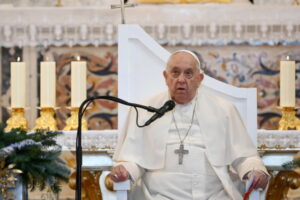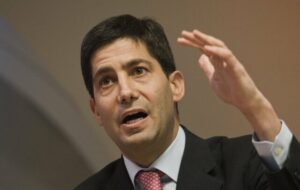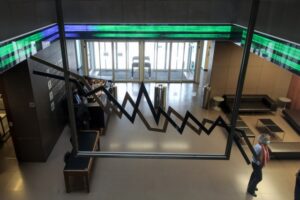Pope Francis intensified his criticism today of Israel’s military campaign in Gaza, calling the humanitarian situation in the Palestinian enclave “very serious and shameful.”
In other parts of his speech, the leader of the Roman Catholic Church spoke of an era of “fake news” and warned about the distortions caused by artificial intelligence when used to “manipulate consciences.”
In his annual address to diplomats, delivered on his behalf by an aide, Francis appeared to reference deaths due to the winter cold in Gaza, where there is virtually no electricity.
“We cannot in any way accept the bombing of civilians,” the text of the speech stated.
“We cannot accept that children freeze to death because hospitals have been destroyed or [because] a country’s energy network has been struck.”
The 88-year-old pope was present at the event but asked an aide to read the speech on his behalf as he is recovering from the flu.
The remarks were made during a speech to accredited representatives from around 184 countries at the Vatican, an event sometimes referred to as the pope’s “state of the world” address. Among those in attendance was Israel’s ambassador to the Holy See.
The leader of the 1.4 billion-member Roman Catholic Church is typically cautious and refrains from taking sides in conflicts.
However, he has recently been more direct in his statements regarding Israel’s military campaign against the Palestinian Islamist organization Hamas and has hinted that the international community should consider whether the offensive constitutes genocide against the Palestinian people.
An Israeli minister publicly criticized the pontiff in December for making such a suggestion.
The Israel-Hamas war began when Palestinian fighters attacked communities in southern Israel on October 7, 2023, killing 1,200 people, mostly civilians, and taking more than 250 hostages back to Gaza, according to Israeli authorities.
Israel’s retaliatory campaign, which it says aims to eliminate Hamas, has killed at least 46,000 people, mostly civilians, according to authorities in Hamas-governed Gaza. The campaign has displaced nearly the entire population and turned much of the enclave into rubble.
In other parts of his speech today, Pope Francis spoke of an era of “fake news” and warned about the distortions caused by artificial intelligence when used to “manipulate consciences.”
The pontiff, who is often the target of unfounded rumors and AI-generated images, frequently speaks out against “fake news” and the relativization of historical facts or phenomena that have been verified by scientific consensus in favor of “alternative” versions.
“Societies today are becoming increasingly polarized,” he said, adding that this trend is “exacerbated by the continuous creation and dissemination of fake news that not only distort the reality of events but ultimately distort consciences, leading to a false perception of reality.”
“Human beings have the gift of an innate thirst for truth,” he continued, “but in our time, the denial of obvious truth seems to have the upper hand.”
“Some question logical arguments, perceiving them as tools in the hands of a mystical authority, while others believe themselves to be the sole holders of truth that they themselves have constructed.” These distortions, he warned, “can be amplified by modern communication tools and artificial intelligence, which are abusively used as instruments of manipulation for economic, political, and ideological purposes.”
To combat these challenges, Francis stressed the need to educate and raise awareness among young people about critical thinking.
“Education is meant to provide the necessary tools for the development of critical capacity so that young people have the means required for their personal growth and their active participation in the future of their society,” he emphasized.
He concluded his extensive commentary on fake news by advocating for a “diplomacy of hope,” which he described as “a diplomacy of truth.”
Ask me anything
Explore related questions





